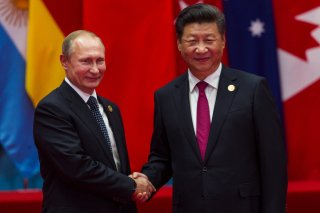Why China Is Taking Russia’s Side in Ukraine
Whatever Chinese diplomats say to the Western public, their leaders are promoting a Russian victory in Ukraine.
As the U.S. intelligence community ramps up its warnings that China is considering arming the Russian war machine in Ukraine, many the world over are worried.
They believe what Tobias Ellwood, an influential British member of parliament, and Hamish de Bretton-Gordon, a retired British Army colonel and fellow at Cambridge University, have written in the British press: that this is the beginning of a new Cold War. Unequivocally, they write, this is the start of a new phase: double or quits.
The German newspaper Der Spiegel reports that China is in late-stage negotiations to supply Russia with kamikaze drones—a supplement to the Iranian Shaheed drones Russia has already made extensive use of in its war in Ukraine. The newspaper also reports that a China-affiliated cut-out firm plans to deliver the blueprints and training to allow Russia to produce Chinese drones—about 100 per month—on the equivalent of a license.
CIA Director William J. Burns has insisted that the United States has no evidence of current arms deliveries from China to Russia, nor does it know that a decision to supply Russia has been officially made. But the fact that Wang Yi, China’s top diplomat, visited Moscow on the anniversary of Russia’s invasion, many say, makes his country’s intentions very clear.
Many have seemingly forgotten that before Russia invaded Ukraine, Russian president Vladimir Putin held a meeting with President Xi Jinping of China, where the two men declared their countries’ “friendship without limits.” That has not been repudiated at any time since Russia launched its war days after the Xi-Putin meeting.
While it might be possible to confect a story of limited Chinese patience with Russian imperialism—spinning Chinese abstention in votes at the United Nations and Chinese leaders cautioning their Russian counterparts over the possibility of nuclear use—this would be a distortion of the facts. China is in Russia’s corner in Ukraine—and has been from the very beginning.
For the past year, China has happily bought Russian commodities—both oil and gas—in defiance of international sanctions. Chinese firms have also skirted international sanctions on both financial products and high technology, building a sophisticated machine of false companies, phoney intermediaries, and jurisdictional loopholes to ensure that the Russian war machine gets its fix of Chinese technology.
What has been successfully done for North Korea over the past eighty years—immense Chinese support camouflaged and sandbagged—is now beginning to be done for Russia. This connection will only intensify as the Russian economy runs into longer-term structural problems caused by deficit financing, capital controls, the closing of foreign markets for Russian hydrocarbons, technology shortages, artificial deflationary measures, and more.
Russia is increasingly dependent on China for capital and resources, and far from seeing this as a needs-must operation, or an opportunistic example of exploiting a weaker partner, the Chinese state is effectively propping up Russia for geopolitical reasons.
All this despite what Chinese officials declare when they talk to the Western press.
There is a vital lesson to learn here: what China says, especially through media outlets based in democracies, is not identical to what it wants—or even what it does. What China says to the West is very different from what its leaders say in Chinese to their own people.
Chinese state media is resolutely behind Russia’s invasion; its correspondents embed with Russian forces, interview Russian propagandists and government officials, and spread a view of the world entirely analogous to Vladimir Putin’s most paranoid fantasies. The world of Chinese state media is one in which the state blames the United States and NATO for forcing Russia into this war—a war that must be won in order to defeat the “American way of geopolitics” and usher in the “multipolar world” of Russian and Chinese dreams.
Whatever Chinese diplomats say to the Western public, their leaders are promoting a Russian victory in Ukraine—above all else, to teach the Americans a lesson.
As Foreign Policy’s James Palmer writes, “Anti-U.S. sentiment in Chinese state media has ramped up since the spy balloon crisis began. Much of it has focused on Russia’s war in Ukraine, which Chinese outlets portray as a righteous response to NATO aggression.”
This is the true face of China’s policy towards Ukraine, in which aid to Russia is morally justified and can be used as a ratchet to punish an American ally and prove American and European geopolitical efforts worthless.
As I write in my recent book, autocracies work together to prop up their shared views of the world—to make the world safe for tyranny. China was always going to support Russia’s invasion of Ukraine by whatever means it had available. This is something policymakers should have expected from the beginning.
Secretary of State Antony Blinken has vowed that China will face tremendous consequences, including sanctions, if it does indeed directly arm Russia. It is his job to ensure that, in this likely event, he keeps his word and ensures that American policy does not wriggle out of doing what may soon be grimly necessary.
Dr. Azeem Ibrahim is a Director at the Newlines Institute for Strategy and Policy in Washington DC and Research Professor at the Strategic Studies Institute U.S. Army War College.
Image: Plavi011/Shutterstock.

